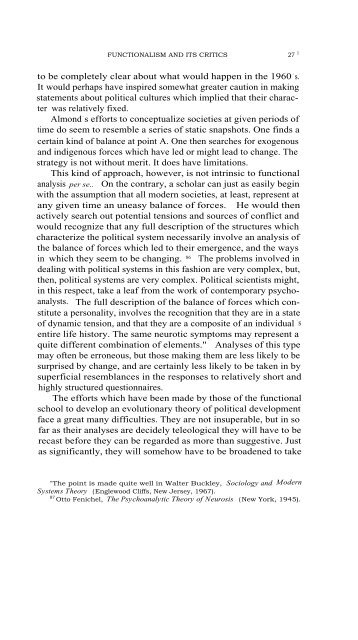FUNCTIONALISM AND ITS CRITICS - Intercollegiate Studies Institute
FUNCTIONALISM AND ITS CRITICS - Intercollegiate Studies Institute
FUNCTIONALISM AND ITS CRITICS - Intercollegiate Studies Institute
You also want an ePaper? Increase the reach of your titles
YUMPU automatically turns print PDFs into web optimized ePapers that Google loves.
<strong>FUNCTIONALISM</strong> <strong>AND</strong> <strong>ITS</strong> <strong>CRITICS</strong> 27 1<br />
to be completely clear about what would happen in the 1960 ' s.<br />
It would perhaps have inspired somewhat greater caution in making<br />
statements about political cultures which implied that their character<br />
was relatively fixed.<br />
Almond ' s efforts to conceptualize societies at given periods of<br />
time do seem to resemble a series of static snapshots. One finds a<br />
certain kind of balance at point A. One then searches for exogenous<br />
and indigenous forces which have led or might lead to change. The<br />
strategy is not without merit. It does have limitations.<br />
This kind of approach, however, is not intrinsic to functional<br />
analysis per se.. On the contrary, a scholar can just as easily begin<br />
with the assumption that all modern societies, at least, represent at<br />
any given time an uneasy balance of forces. He would then<br />
actively search out potential tensions and sources of conflict and<br />
would recognize that any full description of the structures which<br />
characterize the political system necessarily involve an analysis of<br />
the balance of forces which led to their emergence, and the ways<br />
in which they seem to be changing. S6 The problems involved in<br />
dealing with political systems in this fashion are very complex, but,<br />
then, political systems are very complex. Political scientists might,<br />
in this respect, take a leaf from the work of contemporary psychoanalysts.<br />
The full description of the balance of forces which constitute<br />
a personality, involves the recognition that they are in a state<br />
of dynamic tension, and that they are a composite of an individual ' s<br />
entire life history. The same neurotic symptoms may represent a<br />
quite different combination of elements." Analyses of this type<br />
may often be erroneous, but those making them are less likely to be<br />
surprised by change, and are certainly less likely to be taken in by<br />
superficial resemblances in the responses to relatively short and<br />
highly structured questionnaires.<br />
The efforts which have been made by those of the functional<br />
school to develop an evolutionary theory of political development<br />
face a great many difficulties. They are not insuperable, but in so<br />
far as their analyses are decidely teleological they will have to be<br />
recast before they can be regarded as more than suggestive. Just<br />
as significantly, they will somehow have to be broadened to take<br />
"The point is made quite well in Walter Buckley, Sociology and Modern<br />
Systems Theory ( Englewood Cliffs, New Jersey, 1967).<br />
87 Otto Fenichel, The Psychoanalytic Theory of Neurosis ( New York, 1945).
















